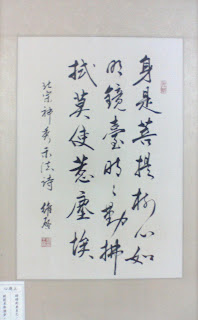My body is Bodhi tree, and my heart is smooth as a mirror.
We should always wipe the ground, in order not to let a dust fall on it.
Shenxiu(606-706), with the common surname of Li, born in Bianzhou, Weishi. He monked during the ending period of Sui Dynasty. He ordained during the period of Gaozu Takenori. At the age of 50, Si Zen Wuzu Hongren got promotion to Theravada Buddhist after six years’ efforts. After Hongren died, he moved to live in Yuquan Temple, Dangyang mountain. Jiangling, and created North Zen. When he died, he was awarded Chase Jackson.
On the first year of Tang Dynasty, he made conversation with his brother, writing down the poetry sentence: My body is Bodhi tree, and my heart is smooth as a mirror. We should always wipe the ground, in order not to let a dust fall on it (interpreted by literal meaning, cited by translator). The meaning of the sentence is: The body is the fundamental of awareness (Linten has the meaning of awareness, and previously Sakyamuni became Buddha under Pippala tree after awareness. So descendents call this tree Linten), and the heart is as smooth as a mirror, which can illuminate all the things in the world. When the image of thing comes, the mirrors do not increase in number, and when the image of thing goes, the mirrors do not decrease in number. Here the word “body” and “heart” is intertextually with the same meaning. This arrangement is just as to be accordance with poetry sentence grammar.
Hui Neng ( later called Sixth Patriarch of Zen) wrote a poetry: Linten is actually awareness, not a tree. Although heart is like a mirror, there is actually no mirror. Originally there is nothing here, where does dust come from? (In English “the tree of Linten” means peepul, Bo-tree, Large tree, etc, and they all mean generousity, mercy, differenciating good and evil, and being aware of truth.) (And in the classification of Botany, The Lartin name of Linten is Ficus religosa, having the meaning of saint religion.)
神秀 (606-706),俗姓李,汴州尉氏(今河南尉氏)人。隋末出家。唐高祖武德年间在洛阳受戒。五十岁时嗣禅宗五祖弘忍,历六年,升为上座僧。弘忍卒后,移住江陵当阳山玉泉寺,开禅宗北宗一派。卒谥大通禅师。
唐朝初年,他与师兄慧能对话,写下诗句:身是菩提树,心如明镜台,时时勤拂拭,莫使惹尘埃。意思说:身是觉悟的根本(菩提是觉悟的意思,以前释迦牟尼在毕钵罗树下觉悟成佛,后世便将此树称为菩提树),心像明镜一样,能照万物。物象来时,镜不增加,物象去时,镜不减少。这里的“身”和“心”,实是互文,意思相同,只是为了符合诗歌的句法而作的安排。慧能(后来称禅宗六祖) 对写了这么一首诗:菩提本无树,明镜亦非台,本来无一物,何处惹尘埃。(在英语里“菩提树”一词为peepul、Bo-Tree或Large-Tree等,均有宽宏大量,大慈大悲,明辨善恶,觉悟真理之意。) (而在植物分类学中,菩提树的拉丁学名为Ficus religosa,有神圣宗教之意。)

No comments:
Post a Comment